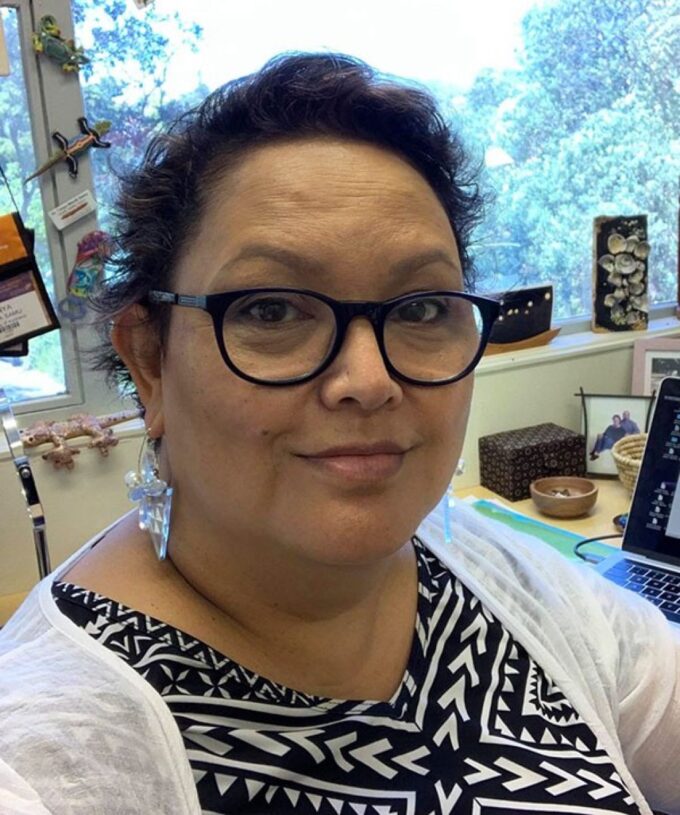
Dr Tanya Samu
Professional learning and development (PLD) on how to get the best out of Tapasā is now available to early childhood centres and schools with high numbers of Pacific learners across Aotearoa.
It will be provided by Tui Tuia| Learning Circle, using a programme developed by Waipapa Taumata Rau | University of Auckland Pacific researchers, along with Tui Tuia’s Pacific team, and co-delivered with Tautai ole Moana, a programme designed to improve outcomes for Pacific learners.
Pacific researcher Dr Tanya Samu, a senior lecturer in the University’s Faculty of Education and Social Work, says because education is connected to things like health, housing, employment, “improving educational outcomes for Pacific people is about social justice, equity and fairness, yes, but it would be an economic driver too”. Dr Samu’s research is cited in the training.
The Tapasā (a Samoan word for a compass or a guide) framework was introduced in 2018, but it’s still relatively new to teachers as its wider dissemination was disrupted in by Covid-19, says Jacoba Matapo, Associate Dean Pasifika at the Faculty, and one of the developers of the programme.
“Tapasā is quite unique in that it goes right across from early childhood into secondary school and also from student teacher to school leader. It’s a very comprehensive framework.”
It’s built on three turu or braces/supports, says Dr Samu. “Awareness of the diverse identities, languages and cultures of Pacific learners; building strong and collaborative relationships between educators, families and communities and pedagogies that are effective for Pacific learners.”
She says Tui Tuia’s Tapasā training is tailored to the needs of the schools receiving it.
“If you’re in Oamaru, which has in recent years seen a significant increase in the Tongan population, you might need to learn more about Tongan culture.
“But if you’re a teacher in Pukekohe, which has a large Kiribati community, you’d need to learn about that non-Polynesian culture so you can engage with your specific Pacific learners.”
Dr Matapo says things would be different again at a school where Pacific students from a variety of backgrounds make up the majority, or at a school where many students are recent arrivals as opposed to one where Pacific communities are long-established.
“The needs and goals of early childhood education centres also differ from those of primary or secondary schools.”
Crucially the needs, backgrounds and goals of individual school teams and educators shape the training they receive.
Our solution is about co-designing the whole process with our participants,” says Dr Matapo.
“When our participants reach the goals they’ve set for themselves, that’s when we’ll know we’ve succeeded.”
She says although the Tapasā training is bespoke there are common elements; one being for educators to take a look at themselves.
“That means knowing their ‘why’ and also confronting their own assumptions and biases. This involves looking at their understandings of culture, identity, language and the value of these things in the lives of the students they’re teaching.”
Teachers are also encouraged to examine their relationships with their students.
“Teachers ask themselves: ‘Do my Pacific learners feel valued in the way I interact and engage?’ You can have a whole suite of pedagogical strategies, but without that relational connection, they won’t stick,” she says.
The training emphasises that relationships extend beyond the classroom.
“The past 20-plus years of research have really underlined the importance of families,” says Dr Samu. “That may not sound like rocket science but there has been a tendency in the past for schools to set the terms of that relationship. It’s been about how parents can support schools rather than the other way around. Relationships need to flow both ways.”
Educators must also examine whether Pacific learners feel their cultures, languages and identities are valued at school, she says.
“It’s not just about whether students feel their cultures are respected, but also about harnessing aspects of those cultures for learning across different subjects.”
A concrete example in the framework is that of a high school science teacher who invited some of his Pacific students’ parents to co-teach a class by talking about how to make umu, the Samoan term for earth ovens. He explained the scientific concepts involved, like thermodynamics and convection.
A follow-up involved actually preparing an umu and cooking food, which helped the teacher understand more about the cultural aspects of umu-making and deepened his relationships with parents. Students, meanwhile, gained a better understanding of the science behind umu and of the value of traditional knowledge and culture.
While this framework is an important and positive start, Drs Samu and Matapo would like to see Pacific knowledge and traditions in the national curriculum, and Dr Samu is currently contributing her ideas and research to a curriculum review.
They would also like to ensure initiatives focused on Pacific learners are designed and led by Pacific people, as this has been, and see more done to examine and address structural racism within education.
Educators and politicians are trying to address the current teaching shortage through different policy settings.…
Melanie Webber was the president of the secondary school union PPTA Te Wehengarua from 2021…
Wait times for paediatric care is having an impact on young people’s education and the…
Home of the brave, land of the free… except when it comes to books for…
Could a gender achievement gap in maths be due to confidence? Sarah Buckley from the…
The much-delayed English draft curriculum is now out for consultation, generating discussion from teachers.
This website uses cookies.